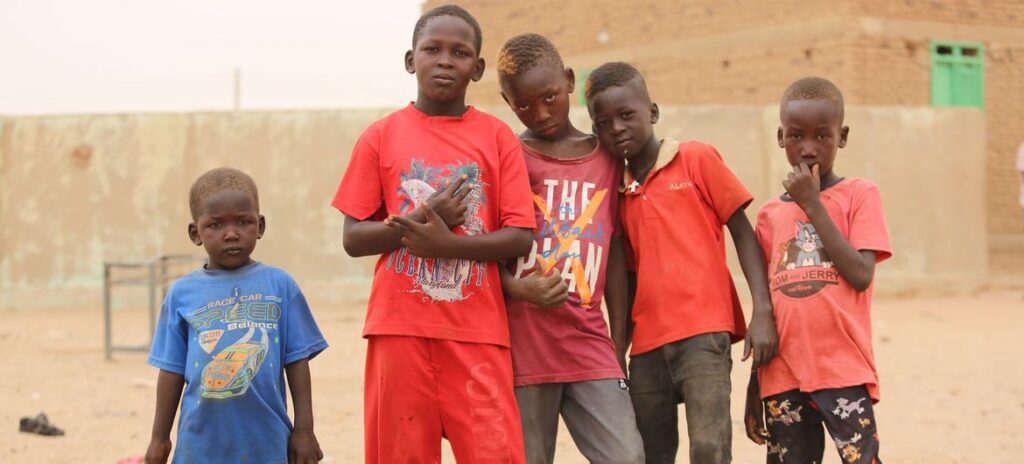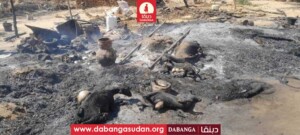‘Nearly 14 million children in Sudan in need of aid’

Children displaced by conflict are now living in Atbara (Abdulazeem Mohamed / UNICEF)
According to UN agencies, at least 24 million people across Sudan require aid, which is more than half of the population. The majority is facing severe hunger and six million people are on the brink of famine. Around 14 million children need humanitarian aid. Three million under-fives are malnourished. “The UN and 93 humanitarian partners have been delivering aid wherever they can.”
Nearly four million people in Sudan have fled their homes to seek safety. , including across the border into Chad, South Sudan, the Central African Republic, Ethiopia, and Egypt, representatives of the UN Children’s Fund (UNICEF) and the UN Office for the Coordination of Humanitarian Aid (OCHA) said in a press conference in New York on Friday.
“In Sudan, children are being killed, injured, abducted, and even recruited into armed groups. They have fallen victim to ethnic- and gender-based violence, while the schools and hospitals they depend on are being damaged, destroyed and looted,” Ted Chaiban, UNICEF’s Deputy Executive Director for Humanitarian Action and Supply Operations, stated.
“Nearly 14 million children desperately need humanitarian relief,” he said. “Furthermore, three million under-fives in Sudan are malnourished, with 700,000 at risk of severe acute malnutrition and mortality. Some 1.7 million children could miss out on critical vaccinations, raising the risk of disease outbreaks.
“In White Nile state we currently have what is usually a lethal combination, which is acute watery diarrhoea, measles and malnutrition in the same place, and that needs to absolutely be contained because otherwise the consequences are severe,” he added.
Aid provided
Edem Wosornu, Director of OCHA’s Operations and Advocacy Division, “pointed to ‘the good news amidst all this gloom’, as the UN and 93 humanitarian partners have been delivering aid wherever they can.
“We have been able to get to hard-to-reach areas,” she said. “We’re able to move trucks from Port Sudan to Darfur, and this is through de-confliction, talking to the parties to the conflict, allowing us to move goods as we could.”
OCHA has facilitated the movement of some 780 trucks carrying 35,000 metric tons of relief supplies since fighting broke out in mid-April. “Each of these movements requires extensive painstaking negotiations to ensure that we don’t get more deaths of civilians or the 18 aid workers that have been killed so far,” she said.
Activist Mudasir Fadul, living in Khartoum, told Radio Dabanga yesterday that the humanitarian situation in the capital is becoming increasingly difficult. “More and more people have run out of their cash and are in need of urgent humanitarian assistance.”
He also pointed to the need of a ceasefire. “Without a truce, relief organisations cannot provide any service to the needy here in Khartoum,” he said. “Only in the areas controlled by the army you find a few organisations able to help out.”
Displaced
About 3.9 million people have had to flee their homes after a violent power struggle broke out between the Sudan Armed Forces (SAF) and its paramilitary counterpart the Rapid Support Forces (RSF) on April 15.
More than three million of them sought refuge inside the country. People have been displaced across all 18 states, the majority of whom are in River Nile state, Northern State, North Darfur, and White Nile state.
At least two of these three million newly displaced (about 71 per cent) are from Khartoum state. About 38,400 people fled to relatives or rented accommodations in other places in the state. The majority fled to other states in the country.
West Darfur, that fell prone to extremely violent attacks by members of the RSF and large groups of allied Arab gunmen after the war broke out, currently hosts about 119,500 displaced people in nine locations across the state, OCHA reported yesterday.
Eastern Chad
Most of the people who were able to flee the violence in West Darfur crossed the border to Chad, where the local authorities and the UN refugee agency (UNHCR) have been providing shelters at existing refugee camps and setting up new camps.
Radio Dabanga’s correspondent in eastern Chad reported on Sunday that about 4,000 families live in the open in the Tangi camp “because all the tents for the new refugees are full”.
According to the International Organization for Migration (IOM), the number of Darfuri who crossed into Chad since end April, has reached more than 350,000.
“The flow of people fleeing from Darfur to Chad continues on a daily basis, especially from West Darfur,” the source said.
He also reported that construction is continuing at the Arkom camp in preparation for receiving refugees from the overcrowded shelter sites near Adré. They referred to a decision by the Chadian authorities and the United Nations High Commissioner for Refugees (UNHCR) to establish a new camp in the Tingouri region to deport refugees from Adri, Chad, in view of the increasing number of Sudanese refugees arriving daily in eastern Chad.
On July 20, Radio Dabanga reported that people who fled the violence in West Darfur to eastern Chad were suffering from harsh conditions, including food shortages and insufficient shelter materials, amidst heavy rainfall. At least 65 children died from malnourishment.
White Nile state
More than 272,300 people who fled the violence in Khartoum state arrived in White Nile state, IOM reports. More than half of them are living with relatives, 30 per cent are living in camp-like settlements, 9.8 per cent have rented accommodations, and the rest are staying in schools, public buildings or in open areas.
The White Nile Emergency Room, set up by volunteers, reported that the number of makeshift shelters in the state has increased to 83.
“While the influx of new people is still continuing, the health conditions are deteriorating, and food shortages are growing,” Emad Salem, a member of the emergency room, told Dabanga Radio on Monday.
“The rainfall not only caused the collapse of many latrines in the shelters, but also led to the breeding of mosquitoes and flies that spread malaria diseases and schistosomiasis. A large number of snake bites have been recorded as well.”
The emergency room is preparing a number of secondary schools as alternative shelters for the elementary school buildings schools damaged by the rains.
Salem further reported “a significant shortage of medicines and mosquito nets, while any epidemic control mechanism is absent” and warned of a “health disaster if the concerned authorities do not intervene urgently”.
Humanitarian response
“Insecurity, bureaucratic access impediments, and looting of humanitarian premises and warehouses across the country continue to negatively impact the delivery of assistance,” OCHA reported yesterday.
“At least 18 aid workers have been killed, with many others injured or detained, since the start of the conflict in mid-April. Between 15 April and 3 August 2023, there have been 53 attacks on health care, resulting in 11 deaths and 38 injuries, according to the WHO Surveillance System for Attacks on Health Care (SSA). These figures only represent attacks that WHO has been able to verify through its verification system.
“Attacks on health care include incidents involving hospitals, ambulances, laboratories, warehouses, health workers and patients. Some humanitarian organizations have also been forced to shutter offices or suspend operations in areas they are unable to access due to security concerns, mainly in Khartoum and the Darfur region. Any remaining resources will be used to scale up operations in accessible areas.
“Funding shortfalls, the limited capacity of humanitarian personnel and government counterparts on the ground, lack of fuel needed for the transportation of humanitarian supplies and staff, lack of access to money in banks, and difficulties in delivering humanitarian supplies to areas outside state capitals due to insecurity have also affected the humanitarian response. These challenges are further compounded by power outages, as well as poor internet and telephone connectivity,” OCHA stated.











 and then
and then